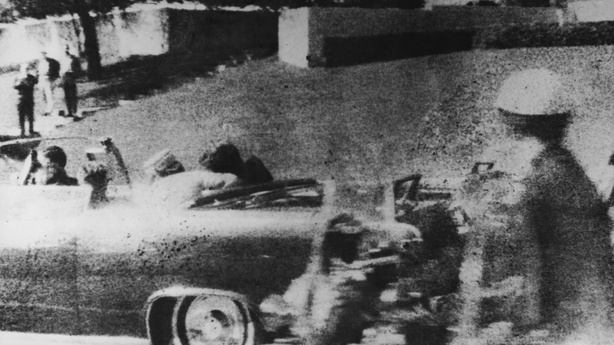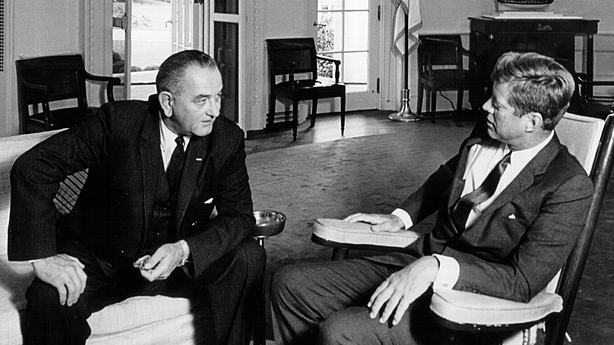US President Donald Trump has ordered the release of 2,800 documents related to the 1963 assassination of President John F Kennedy.
However, he yielded to pressure from the FBI and CIA to block the release of other records, which will be the subject of a further review.
Congress had ordered in 1992 that all remaining sealed files pertaining to the investigation into Kennedy's death should be fully opened to the public through the National Archives in 25 years, by 26 October 2017, except for those the president authorised for further withholding.
Mr Trump had confirmed on Saturday that he would allow for the release of the final batch of once-classified records, amounting to tens of thousands of pages, "subject to the receipt of further information".
But as the deadline neared, the administration decided at the last minute to stagger the final release over the next 180 days while government agencies studied whether any documents should stay sealed or redacted.
The law allows the president to keep material under wraps if it is determined that harm to intelligence operations, national defence, law enforcement or the conduct of foreign relations would outweigh the public's interest in full disclosure.
More than 2,800 uncensored documents were posted to the National Archives website yesterday evening.
The massive cache of documents is being pored over by news outlets, investigators, scholars and conspiracy theorists.
The rest of the documents will be released "on a rolling basis," with" redactions in only the rarest of circumstances," by the end of the review on 26 April 2018, the White House said in a statement.
In a memo to government agency heads, Mr Trump said the American people deserved as much access as possible to the records.
"Therefore, I am ordering today that the veil finally be lifted," he wrote, adding that he had no choice but to accept the requested redactions for now.
Read more:
Kennedy Assassination Records
JFK in quotes
Release of JFK files excites conspiracy theorists
A CIA spokesman said that every single one of approximately 18,000 remaining CIA records in the collection would ultimately be released, with just 1% of the material left redacted.
CIA Director Mike Pompeo was a lead advocate in arguing to the White House for keeping some materials secret, one senior administration official said.
While Kennedy was killed over half a century ago, the document file included material from investigations during the 1970s through the 1990s.
Intelligence and law enforcement officials argued their release could thus put at risk some more recent law enforcement equities and other materials that still have relevance, the official said.
Mr Trump was resistant but acceded to it with deep insistence that this stuff is going to be reviewed and released in the next six months, the official added.

President Kennedy was shot dead as he travelled in Dallas on 22 November 1963.
Within hours, Lee Harvey Oswald, 24, was charged with killing the president.
However, he never had the chance to give his version of events as he was shot dead by Jack Ruby while in police custody on 24 November.
An official inquiry, the Warren Commission set up by President Lyndon Johnson, determined that Oswald acted alone. It also found that Ruby was not part of a bigger plot or cover-up.
With thousands of pages of records, it is likely to take experts and historians weeks to scour them for significant pieces of information.
However, documents from then-FBI director J Edgar Hoover reveal that the Soviet Union feared they would be blamed for putting Oswald up to assassinating Kennedy, and that a threat had been made to kill Oswald the night before he was shot.
There are also notes and reports that reveal the Kennedy administration's covert efforts to upend Fidel Castro's government in Cuba, as well as a 400-page document that appears to describe people being monitored as potential threats to Kennedy and his successor, Lyndon B Johnson.

Anonymous call to local British newspaper
Other documents have shown that a British local newspaper received an anonymous call about "some big news" in America 25 minutes before Kennedy was assassinated.
A memo to the director of the FBI said the anonymous phone call was made to the senior reporter at the Cambridge News at 6.05pm on the day Kennedy was shot.
The document, from deputy director James Angleton, said: "The British Security Service (MI-5) has reported that at 1805GMT on 22 November an anonymous telephone call was made in Cambridge, England, to the senior reporter of the Cambridge News.
"The caller said only that the Cambridge News reporter should call the American Embassy in London for some big news and then hung up."
Kennedy was shot as he rode in a presidential motorcade in Dealey Plaza at 12.30pm Central Standard Time, which is six hours behind Greenwich Mean Time.
The memo added: "After the word of the President's death was received the reporter informed the Cambridge police of the anonymous call and the police informed MI-5.
"The important point is that the call was made, according to MI-5 calculations, about 25 minutes before the President was shot.
"The Cambridge reporter had never received a call of this kind before and MI-5 state that he is known to them as a sound and loyal person with no security record."
Long-secret files being released today will shed more light on the story that captivated the world - the 1963 assassination of JFK pic.twitter.com/HezjjGmOkJ
— RTÉ News (@rtenews) October 26, 2017

